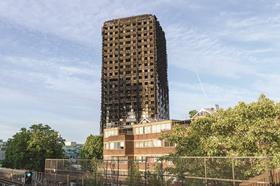Barbara Lane’s submission to public inquiry says no one had carried out fire performance test on cladding

A top fire safety expert has told the public inquiry into last year’s Grenfell Tower fire that the cladding used on the block did not meet building regulations.
And in her submission to the inquiry, which is being chaired by retired judge Sir Martin Moore-Bick, Dr Barbara Lane, a chartered fire engineer at Arup, said there was “no evidence yet” any member of design or construction team had ascertained the cladding’s fire performance, nor was there any evidence building control knew how it would perform in the event of a fire.
Lane’s report, which runs to more than 1,400 pages, comes as survivors and relatives of the 72 victims killed by last June’s blaze prepare to mark the first anniversary of the disaster next week.
In her report, Lane said: “Based on the relevant test evidence submitted to the public inquiry, the construction materials forming the rainscreen cladding system either individually or when assessed as an assembly, did not comply with the recommended fire performance set out in the statutory guidance of ADB 2013 [Part B of the building regulations which deal with fire safety] for a building of that height.”
She added: “I have found no evidence yet that any member of the design team or the construction team ascertained the fire performance of the rainscreen cladding system materials, nor understood how the assembly performed in fire. I have found no evidence that Building Control were either informed or understood how the assembly would perform in a fire.”
Concluding that the failure of the rainscreen cladding system on the building to resist the spread created “multiple catastrophic fire spread-routes”, she also said that vertical and horizontal fire stopping has been incorrectly installed, while the windows “were not provided with fire resisting cavity barriers” and were surrounded by combustible material meaning a fire starting near a window had a “high probability” of spreading to the cladding.
Lane said that fire doors failed while firefighters were hampered in their efforts to contain the fire by an out of action fire lift which, had it been working, Lane said, “might have increased the chances of extinguishing the fire before it spread externally”.
She also said the guidance in Part B was “contradictory” and needed “urgent change” adding that the use of combustible cladding failed the functional requirement of Part B which states that “the external wall of the building shall adequately resist the spread of fire”.
Lane said her findings meant that residents within Grenfell Tower should have been told to evacuate within 45 minutes of the first 999 call due to the external spread of fire. In the event the stay put strategy was not abandoned until nearly three hours after the blaze started.
Her report was one of five published at the start of a fact-finding stage of the inquiry with the phase one of the inquiry not expected to wrap up until the end of October.
This week one of the QCs involved in the inquiry, Richard Millett, warned firms and government departments that had been asked to provide statements to “resist the temptation to indulge in a merry-go-round of buck-passing”.
The second phase is not expected to begin until the new year and will focus on the construction, refurbishment and management of the building prior to the fire.
Prime minister Theresa May has promised to report the inquiry’s findings in full once it is completed.




























No comments yet